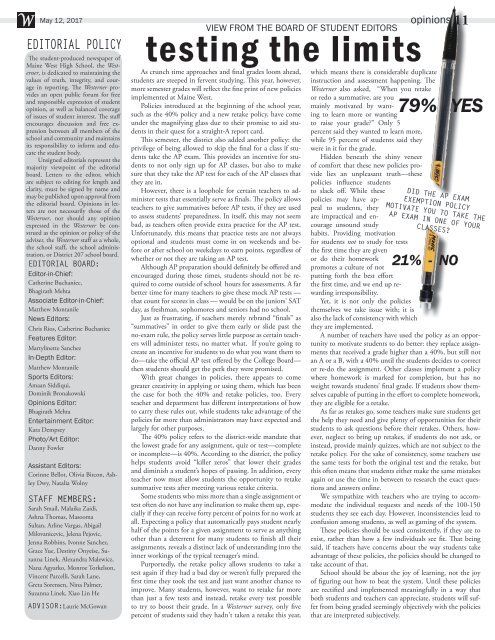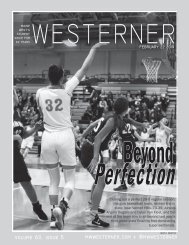Create successful ePaper yourself
Turn your PDF publications into a flip-book with our unique Google optimized e-Paper software.
W<br />
<strong>May</strong> 12, <strong>2017</strong><br />
EDITORIAL POLICY<br />
The student-produced newspaper of<br />
Maine West High School, the Westerner,<br />
is dedicated to maintaining the<br />
values of truth, integrity, and courage<br />
in reporting. The Westerner provides<br />
an open public forum for free<br />
and responsible expression of student<br />
opinion, as well as balanced coverage<br />
of issues of student interest. The staff<br />
encourages discussion and free expression<br />
between all members of the<br />
school and community and maintains<br />
its responsibility to inform and educate<br />
the student body.<br />
Unsigned editorials represent the<br />
majority viewpoint of the editorial<br />
board. Letters to the editor, which<br />
are subject to editing for length and<br />
clarity, must be signed by name and<br />
may be published upon approval from<br />
the editorial board. Opinions in letters<br />
are not necessarily those of the<br />
Westerner, nor should any opinion<br />
expressed in the Westerner be construed<br />
as the opinion or policy of the<br />
adviser, the Westerner staff as a whole,<br />
the school staff, the school administration,<br />
or District 207 school board.<br />
EDITORIAL BOARD:<br />
Editor-in-Chief:<br />
Catherine Buchaniec,<br />
Bhagirath Mehta<br />
Associate Editor-in-Chief:<br />
Matthew Montanile<br />
News Editors:<br />
Chris Rios, Catherine Buchaniec<br />
Features Editor:<br />
Martylinette Sanchez<br />
In-Depth Editor:<br />
Matthew Montanile<br />
Sports Editors:<br />
Amaan Siddiqui,<br />
Dominik Bronakowski<br />
Opinions Editor:<br />
Bhagirath Mehta<br />
Entertainment Editor:<br />
Kara Dempsey<br />
Photo/Art Editor:<br />
Danny Fowler<br />
Assistant Editors:<br />
Corinne Bellot, Olivia Bitcon, Ashley<br />
Dwy, Natalia Wolny<br />
STAFF MEMBERS:<br />
Sarah Smail, Malaika Zaidi,<br />
Ashna Thomas, Masooma<br />
Sultan, Arline Vargas, Abigail<br />
Milovanicevic, Jelena Pejovic,<br />
Jenna Robbins, Ivonne Sanchez,<br />
Grace Yue, Destiny Onyeise, Suzanna<br />
Linek, Alexandra Malewicz,<br />
Nana Agyarko, Monroe Torkelson,<br />
Vincent Parcelli, Sarah Lane,<br />
Greta Sorensen, Nina Palmer,<br />
Suzanna Linek, Xiao Lin He<br />
ADVISOR:Laurie McGowan<br />
VIEW FROM THE BOARD OF STUDENT EDITORS<br />
testing the limits<br />
As crunch time approaches and final grades loom ahead, which means there is considerable duplicate<br />
students are steeped in fervent studying. This year, however, instruction and assessment happening. The<br />
more semester grades will reflect the fine print of new policies Westerner also asked, “When you retake<br />
implemented at Maine West.<br />
or redo a summative, are you<br />
Policies introduced at the beginning of the school year, mainly motivated by wanting<br />
to learn more or wanting<br />
such as the 40% policy and a new retake policy, have come<br />
under the magnifying glass due to their promise to aid students<br />
in their quest for a straight-A report card.<br />
percent said they wanted to learn more,<br />
to raise your grade?” Only 5<br />
This semester, the district also added another policy: the while 95 percent of students said they<br />
privilege of being allowed to skip the final for a class if students<br />
take the AP exam. This provides an incentive for stu-<br />
Hidden beneath the shiny veneer<br />
were in it for the grade.<br />
dents to not only sign up for AP classes, but also to make of comfort that these new policies provide<br />
lies an unpleasant truth—these<br />
sure that they take the AP test for each of the AP classes that<br />
they are in.<br />
policies influence students<br />
However, there is a loophole for certain teachers to administer<br />
tests that essentially serve as finals. The policy allows policies may have ap-<br />
to slack off. While these<br />
teachers to give summatives before AP tests, if they are used peal to students, they<br />
to assess students’ preparedness. In itself, this may not seem are impractical and encourage<br />
unsound study<br />
bad, as teachers often provide extra practice for the AP test.<br />
Unfortunately, this means that practice tests are not always habits. Providing motivation<br />
optional and students must come in on weekends and before<br />
or after school on weekdays to earn points, regardless of the first time they are given<br />
for students not to study for tests<br />
whether or not they are taking an AP test.<br />
Although AP preparation should definitely be offered and<br />
encouraged during those times, students should not be required<br />
to come outside of school hours for assessments. A far<br />
better time for many teachers to give these mock AP tests —<br />
that count for scores in class — would be on the juniors' SAT<br />
day, as freshman, sophomores and seniors had no school.<br />
Just as frustrating, if teachers merely rebrand “finals” as<br />
“summatives” in order to give them early or slide past the<br />
no-exam rule, the policy serves little purpose as certain teachers<br />
will administer tests, no matter what. If you’re going to<br />
create an incentive for students to do what you want them to<br />
do—take the official AP test offered by the College Board—<br />
then students should get the perk they were promised.<br />
With great changes in policies, there appears to come<br />
greater creativity in applying or using them, which has been<br />
the case for both the 40% and retake policies, too. Every<br />
teacher and department has different interpretations of how<br />
to carry these rules out, while students take advantage of the<br />
policies far more than administrators may have expected and<br />
largely for other purposes.<br />
The 40% policy refers to the district-wide mandate that<br />
the lowest grade for any assignment, quiz or test—complete<br />
or incomplete—is 40%. According to the district, the policy<br />
helps students avoid “killer zeros” that lower their grades<br />
and diminish a student’s hopes of passing. In addition, every<br />
teacher now must allow students the opportunity to retake<br />
summative tests after meeting various retake criteria.<br />
Some students who miss more than a single assignment or<br />
test often do not have any inclination to make them up, especially<br />
if they can receive forty percent of points for no work at<br />
all. Expecting a policy that automatically pays student nearly<br />
half of the points for a given assignment to serve as anything<br />
other than a deterrent for many students to finish all their<br />
assignments, reveals a distinct lack of understanding into the<br />
inner workings of the typical teenager’s mind.<br />
Purportedly, the retake policy allows students to take a<br />
test again if they had a bad day or weren’t fully prepared the<br />
first time they took the test and just want another chance to<br />
improve. Many students, however, want to retake far more<br />
than just a few tests and instead, retake every test possible<br />
to try to boost their grade. In a Westerner survey, only five<br />
percent of students said they hadn't taken a retake this year,<br />
opinions 11<br />
79% - YES<br />
DID THE AP EXAM<br />
EXEMPTION POLICY<br />
MOTIVATE YOU TO TAKE THE<br />
AP EXAM IN ONE OF YOUR<br />
CLASSES?<br />
21% - NO<br />
or do their homework<br />
promotes a culture of not<br />
putting forth the best effort<br />
the first time, and we end up rewarding<br />
irresponsibility.<br />
Yet, it is not only the policies<br />
themselves we take issue with; it is<br />
also the lack of consistency with which<br />
they are implemented.<br />
A number of teachers have used the policy as an opportunity<br />
to motivate students to do better: they replace assignments<br />
that received a grade higher than a 40%, but still not<br />
an A or a B, with a 40% until the students decides to correct<br />
or re-do the assignment. Other classes implement a policy<br />
where homework is marked for completion, but has no<br />
weight towards students’ final grade. If students show themselves<br />
capable of putting in the effort to complete homework,<br />
they are eligible for a retake.<br />
As far as retakes go, some teachers make sure students get<br />
the help they need and give plenty of opportunities for their<br />
students to ask questions before their retakes. Others, however,<br />
neglect to bring up retakes, if students do not ask, or<br />
instead, provide mainly quizzes, which are not subject to the<br />
retake policy. For the sake of consistency, some teachers use<br />
the same tests for both the original test and the retake, but<br />
this often means that students either make the same mistakes<br />
again or use the time in between to research the exact questions<br />
and answers online.<br />
We sympathize with teachers who are trying to accommodate<br />
the individual requests and needs of the 100-150<br />
students they see each day. However, inconsistencies lead to<br />
confusion among students, as well as gaming of the system.<br />
These policies should be used consistently, if they are to<br />
exist, rather than how a few individuals see fit. That being<br />
said, if teachers have concerns about the way students take<br />
advantage of these policies, the policies should be changed to<br />
take account of that.<br />
School should be about the joy of learning, not the joy<br />
of figuring out how to beat the system. Until these policies<br />
are rectified and implemented meaningfully in a way that<br />
both students and teachers can appreciate, students will suffer<br />
from being graded seemingly objectively with the policies<br />
that are interpreted subjectively.


















